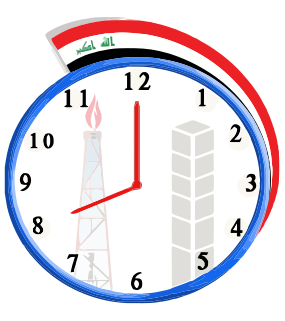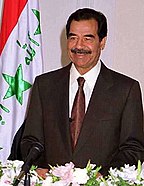The politics of Iraq take place in a framework of a federal parliamentary representative democratic republic. It is a multi-party system whereby the executive power is exercised by the Prime Minister of the Council of Ministers as the head of government, as well as the President of Iraq, and legislative power is vested in the Council of Representatives and the Federation Council.

Ann Clwyd Roberts is a Welsh Labour Party politician serving as Member of Parliament (MP) for Cynon Valley since 1984. She was re-elected at the 2015 general election and 2017 general election despite previously announcing that she intended to retire.

The National Iraqi Alliance, also known as the Watani List, is an Iraqi electoral coalition that contested the Iraqi legislative election, 2010. The Alliance is mainly composed of Shi'a Islamist parties. The alliance was created by the Supreme Council for Islamic Revolution in Iraq to contest in the January 2005 and December 2005 under the name United Iraqi Alliance, when it included all Iraq's major Shi'a parties. The United Iraqi Alliance won both those of elections however later fell apart after several major parties left the alliance due to disputes with Prime Minister Nouri al-Maliki and the Supreme Council.
Elections in Iraq gives information on election and election results in Iraq.

The Council of Representatives is the unicameral legislature of the Republic of Iraq. It is currently composed of 329 seats and meets in Baghdad inside the Green Zone.
There were two national legislative elections in Iraq in 2005:

The Iraqi Turkmen Front is a political movement founded in 1995 which seeks to represent the Iraqi Turkmen people. Since the fall of Saddam Hussein in 2003, the ITF has contested control of Kirkuk and other areas of northern Iraq. The ITF claims that Kirkuk belongs to the Turkmen people although they compose only 13–17 percent of the population.
The Sadrist Movement is an Iraqi Islamic national movement led by Muqtada al-Sadr. The movement draws wide support from across Iraqi society and especially from the Shi'a poor in the country. The most important person in setting the goals and the philosophy of the movement was Grand Ayatollah Mohammad Mohammad Sadeq al-Sadr. A prominent preceding influence had also been Mohammad Baqir al-Sadr. The movement is religious and populist. Its goal is a society ordered by a combination of religious laws and tribal customs.

The State of Law Coalition also known as Rule of Law Coalition is an Iraqi political coalition formed for the Iraqi governorate elections, 2009 by the Prime Minister of Iraq at the time, Nouri al-Maliki, of the Islamic Dawa Party.

The Iraqi Kurdistan presidential elections of 2009 took place on 25 July 2009, coinciding with the Iraqi Kurdistan parliamentary elections of 2009. A total of 2.5 million citizens of Iraqi Kurdistan were eligible to vote in the parliamentary and presidential elections. It is the first time that the President of Iraqi Kurdistan was chosen directly through popular votes. People currently living outside Iraqi Kurdistan were not allowed to vote.

The Kurdistan List, also known as the Kurdistan Alliance or the Brotherhood List, is the name of the electoral coalition that ran in the Kurdistan Regional Government parliamentary elections in Iraqi Kurdistan in July 2009. The Kurdistan List represented a coalition of the two main ruling parties in Iraqi Kurdistan, namely the Kurdistan Democratic Party and the Patriotic Union of Kurdistan. It is the successor of the Democratic Patriotic Alliance of Kurdistan.

The 3 March 2010 Baqubah bombings were a series of three bombings in Baqubah, Iraq, on 3 March 2010 that killed at least 33 people and injured 55 others. Baqubah, a mixed Sunni and Shia town, is the capital of Diyala Governorate, approximately 40 miles (64 km) north of the country's capital, Baghdad.

Parliamentary elections were held in Iraq on 20 June 1980, the first since 1958. The elections were contested by around 860 candidates, and saw the Ba'ath Party win 187 of the 250 seats. Voter turnout was approximately 80%.

Parliamentary elections were held in Iraq on 24 March 1996. The elections were contested by 689 candidates, although 30 MPs were appointed to represent Iraqi Kurdistan. The result was a victory for the Ba'ath Party, which won 161 of the 250 seats. Voter turnout was reported to be 93.5%.

Parliamentary elections were held in Iraq on 27 March 2000. The elections were contested by 522 candidates, including 25 women. Whilst there were a number of candidates, all independent candidates were nominally loyal to the Ba'ath Party, and the rest of the candidates were party members.

Parliamentary elections were held in Iraq on 30 April 2014. The elections decided the 328 members of the Council of Representatives who will in turn elect the Iraqi President and Prime Minister.

The Al-Ahrar Bloc is an Iraqi Shia Islamist political coalition formed for the 2014 Iraqi parliamentary election. It is headed by Dia Najem Abdallah al-Asadi.

Parliamentary elections took place in Iraqi Kurdistan on 30 September 2018 to elect Parliament. The ruling Kurdistan Democratic Party (KDP) came first in a parliamentary election in the Kurdistan Region of Iraq, winning 45 seats, that positioning it to lead the next regional government. A year after a failed bid for independence, Iraq’s Kurds voted last month in a parliamentary election. Announcement of the results was delayed for three weeks. The KDP’s historic rival and junior coalition partner in government, the Patriotic Union of Kurdistan (PUK), was in second place with 21 seats.. The results suggest that Masoud Barzani’s KDP will take a dominant position in Kurdish politics.

The President of Iraqi Kurdistan is the head of an autonomous region in northern Iraq. He is part of the Kurdistan Presidency Council. The position is vacant since 1 November 2017.

Parliamentary elections were held in Iraq on 12 May 2018. The elections decided the 329 members of the Council of Representatives, the country's unicameral legislature, who in turn will elect the Iraqi President and Prime Minister. The Iraqi parliament ordered a manual recount of the results on 6 June 2018. On 10 June 2018, a storage site housing roughly half of the ballots from the May parliamentary election caught fire.


















